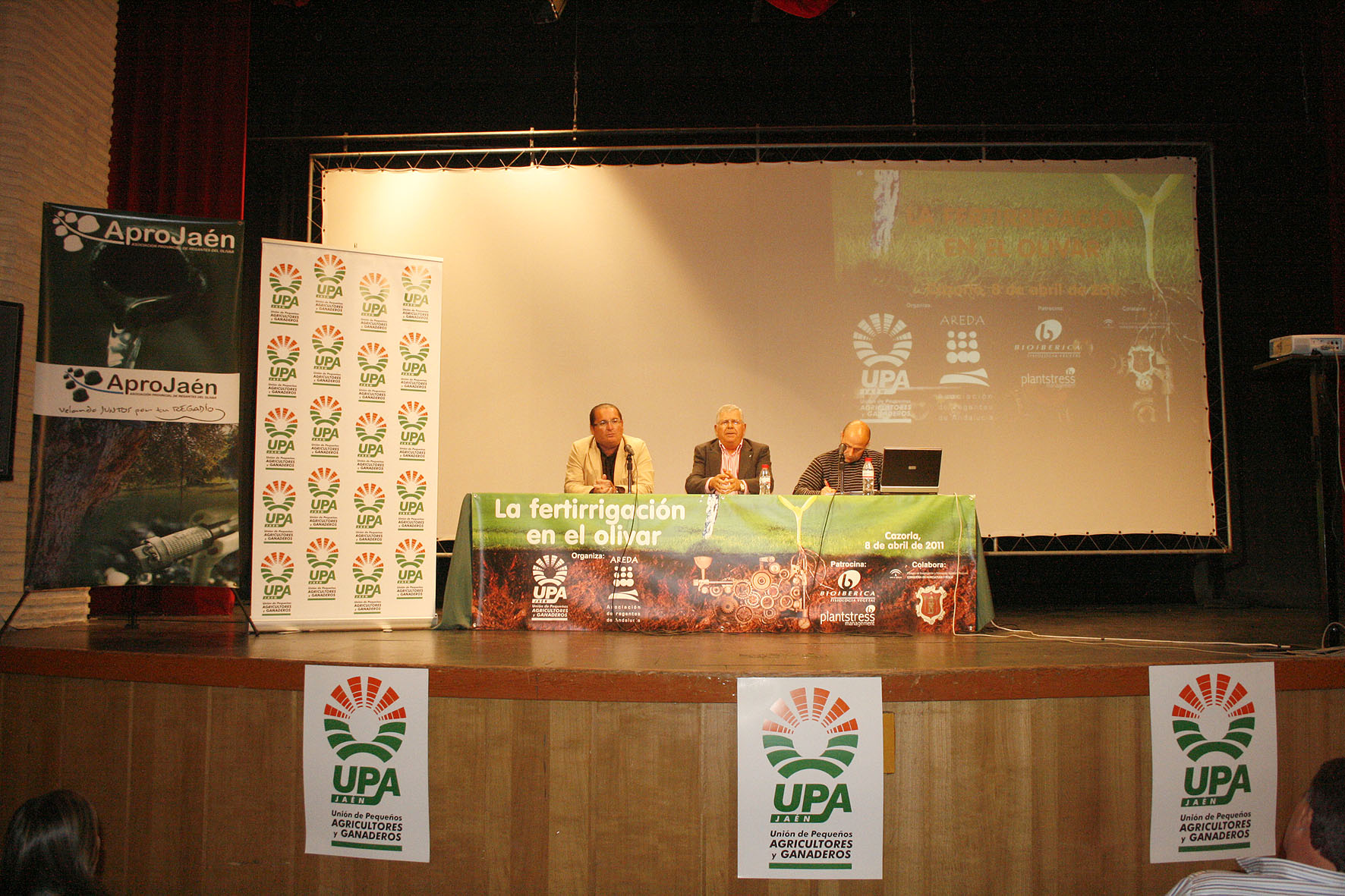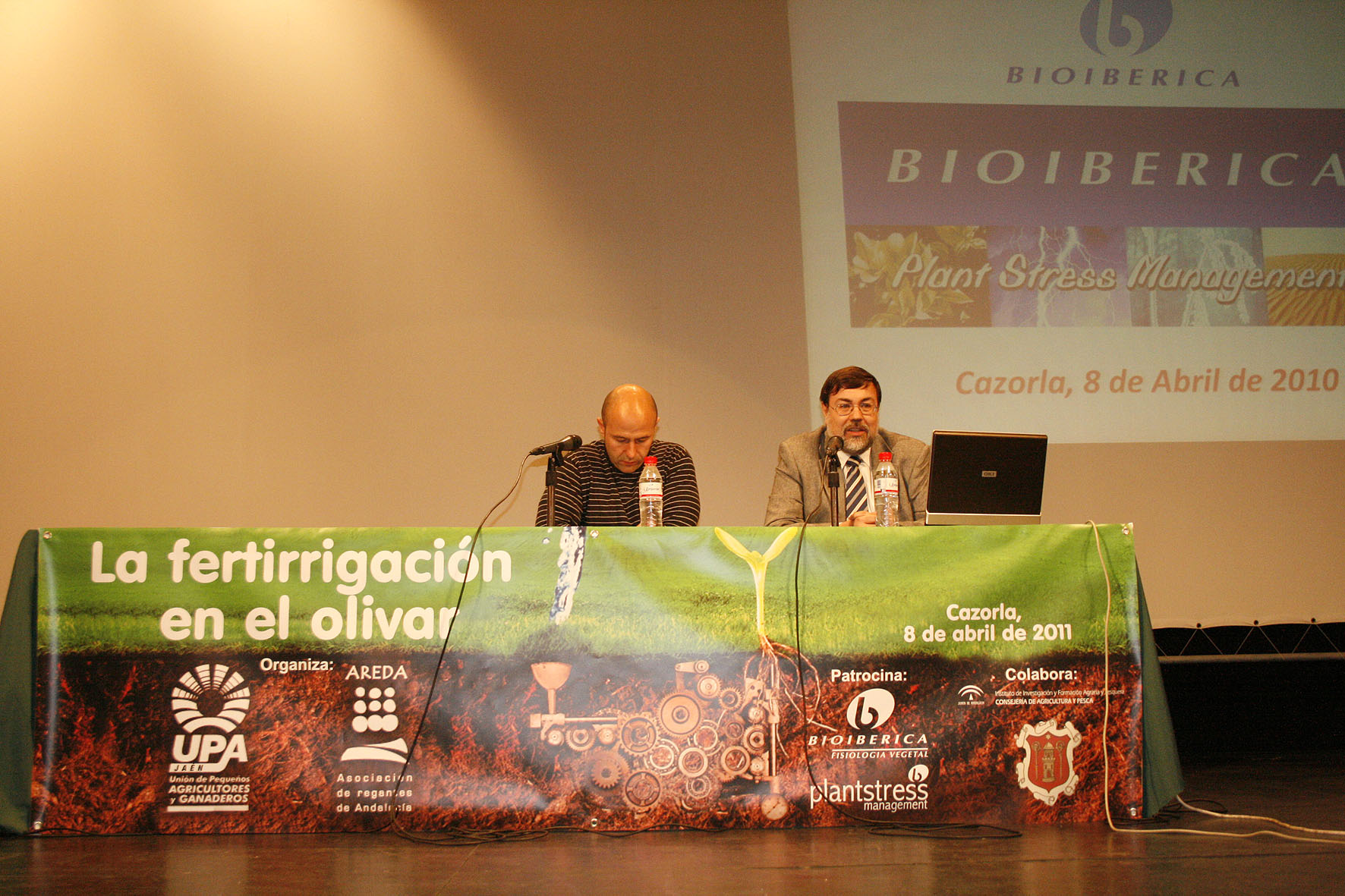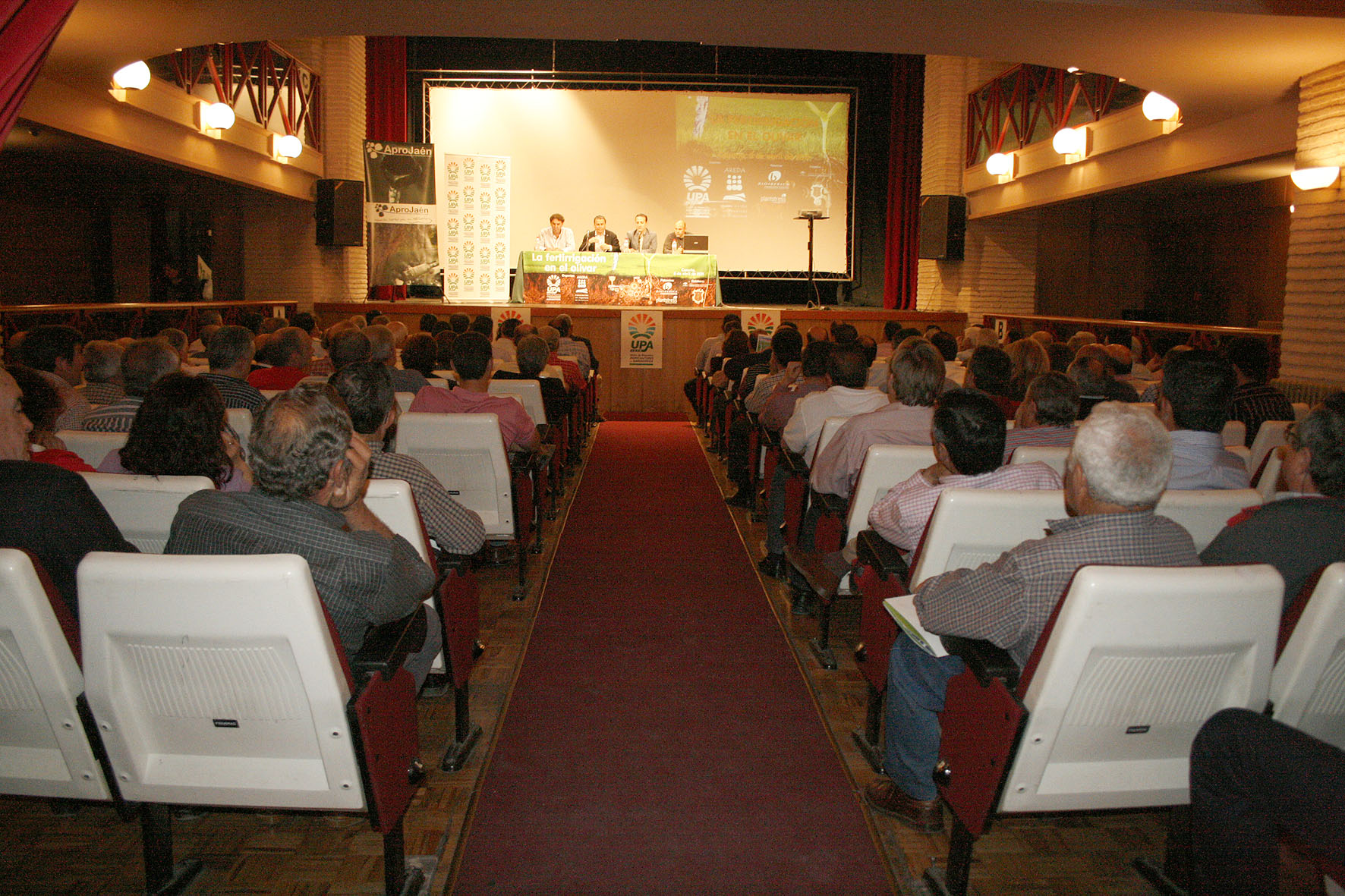The UPA-Jaén and AREDA symposiums, sponsored by BIOIBERICA, highlighted the importance of fertigation for an optimum olive irrigation management to guarantee a larger harvest
The symposium, which was attended by more than 200 irrigators, was inaugurated by the General Secretary of UPA-Andalucía, Mr. Agustín Rodríguez, by BIOIBERICA’ area manager of the Andalucía Olive production area, Mr. Juan Bueno, and by the mayor of Cazorla, Mr. Antonio José Rodríguez
UPA-Jaén and AREDA hosted, with resounding success, a symposium on olive fertigation that was sponsored by BIOIBERICA. The event was held in the La Merced Theatre of Cazorla, with more than 200 irrigators in attendance. The aim of this meeting was none other than to emphasize the role of fertigation as a basic tool to achieve an optimum crop of the olive irrigation and to guarantee a larger, better quality harvest. The inauguration was done by the General Secretary of UPA-Andalucía, Mr. Agustín Rodríguez, by the mayor of Cazorla, Mr. Antonio José Rodríguez, and by the BIOIBERICA area manager of the Andalucía olive production zone, Mr. Juan Bueno. The symposium was officially closed by the president of AREDA, Mr. Marcelo Morales, and by the secretary of agriculture, promotion and marketing of UPA-Jaén, Mr. Luis Miguel Martínez.
 In the opening session, Mr. Agustín Rodríguez emphasized the importance of these kind of events, which highlighted the “spectacular” advances that the olive cultivation has experienced, in particular in the field of irrigation, over the last decades, “although there is still a long road ahead” he added. In this sense, he referred to the sentence of the Constitutional Court on the article 51 of the new Statute of Autonomy of Andalucía regarding the management of the Guadalquivir river basin. Mr. Agustín Rodríguez pointed out that “We will start within a short time the irrigation season, and I just wanted to convey a message of tranquillity. Everything will go ahead as planned, all the regularization processes in this province will go ahead thanks to the concession agreed between the central government and the Junta, which guarantees that the Agencia Andaluza del Agua will continue the proceedings-however, the Central Government will have the final decision on that issue”.
In the opening session, Mr. Agustín Rodríguez emphasized the importance of these kind of events, which highlighted the “spectacular” advances that the olive cultivation has experienced, in particular in the field of irrigation, over the last decades, “although there is still a long road ahead” he added. In this sense, he referred to the sentence of the Constitutional Court on the article 51 of the new Statute of Autonomy of Andalucía regarding the management of the Guadalquivir river basin. Mr. Agustín Rodríguez pointed out that “We will start within a short time the irrigation season, and I just wanted to convey a message of tranquillity. Everything will go ahead as planned, all the regularization processes in this province will go ahead thanks to the concession agreed between the central government and the Junta, which guarantees that the Agencia Andaluza del Agua will continue the proceedings-however, the Central Government will have the final decision on that issue”.
The mayor of Cazorla, Mr. Antonio José Rodríguez, thanked UPA and BIOIBERICA for choosing its municipality to hold this symposium, and evoked its first steps in the world of irrigation. “In the early times of fertigation, around 1988, we tried to set up a familial orchard with drop -by-drop irrigation; we used to solute products in small tanks to try to save water, which was very scarce, and also to try to save on such a expensive thing as fertilizers. This is how we began to cultivate products using homely methods, and why I am so enthusiastic for being here today. This is why I praise this symposium, so thank you again for hosting it here”.
On the other hand, Mr. Juan Bueno, from BIOIBERICA, explained us the aims of the symposium: “We try to spread knowledge on the cultivation we have been doing so far, which it is something that, perhaps because of the difficult times we are going through, sometimes we seem to forget to do; but fertigation allows us an optimum and adequate management of cultivation, so that we can fertilize our olive groves in a more efficient manner. The olive sector is facing great challenges to overcome a changing and complex situation. After years of economic prosperity and fair olive oil prices, we have moved on to a completely opposite situation. The situations of crisis always open up windows for new opportunities- we must identify were the changes are leading us, and adapting to them as rapidly as possible”.
Therefore, he added that “This is why it is necessary a multidisciplinary collaboration to increase the productivity of our olive groves in order to make it more competitive to face the access to the markets of new world areas with lower production costs. The professional cooperatives, which know how to give added value to our “liquid gold” and that, working together with other institutions, promote the quality of our oil in Spain and abroad. The administration should focus its efforts on the development of a more sustainable olive sector and in increasing the value of olive oil. The agrarian syndicates should ensure that the public subsidies make our olive sector as competitive and profitable as any other economical sector. I make a general call to all sectors involved to never give up the struggle and to keep fighting for the olive”.
The first lecture was done by Mr. Javier Hidalgo, agronomist of the IFAPA Alameda del Obispo, Córdoba, who disserted on the fertigation of the olive tree. He explained that fertigation “consists in the supplying of nutrients through irrigation, and that putting them in the plant, in the wet bulb under the soil, increases the fertility of the soil, thus augmenting production and improving quality. It is a fundamental technique which allows to optimize the water used in olive tree irrigation as well as a larger harvest, aside of preventing the loss of fertility of the soil”.
As for the advantages of fertigation, he stated that the fundamental thing is that it exist “the possibility of fertilizing in the more adequate moment and dosage for the cultivation; the rigorous control and the uniformity of distribution of fertilizers; it prevents the impoverishments of the bulbs as well as a quick correction of deficiencies. Finally, he talked about the Trans-forma project, with a budget in excess of €228,000 and the participation of four IFAPA centres. This project has nine working lines which range from the design of olive tree plantations up to the utilization of by-products and olive oil, including also the pruning, soil management, rational fertilization of the olive tree, irrigation, and complete disease control.
 The second lecture was read by Mr. Rafael Piñol, general director of the Plant Physiology Division of BIOIBERICA, on “Terra-Sorb Radicular and amino acids, how they intervene directly in fertigation”. Aside of explaining what is BIOIBERICA, “established in Spain, Poland, United States, Italy and Brazil” and what they do, “we produce natural biomollecules, which are secure for the health, environmentally and for the persons”, plus analyzing the role of amino acids and talking about the Plantstress scientific platform, created in 2008 to “capitalize in the internet the knowledge of plant stress”.
The second lecture was read by Mr. Rafael Piñol, general director of the Plant Physiology Division of BIOIBERICA, on “Terra-Sorb Radicular and amino acids, how they intervene directly in fertigation”. Aside of explaining what is BIOIBERICA, “established in Spain, Poland, United States, Italy and Brazil” and what they do, “we produce natural biomollecules, which are secure for the health, environmentally and for the persons”, plus analyzing the role of amino acids and talking about the Plantstress scientific platform, created in 2008 to “capitalize in the internet the knowledge of plant stress”.
“Amino acids are the organic volumes which conforms the proteins and develop many physiological functions within the plant. The external application of amino acids is not addressed to the vegetative growth, it strengthens the functions carried out by the plant in every moment. They do act as bio-stimulant favouring the recovery from unfavourable conditions (drought, cold, plagues, disease, etc.). As for plant functions, amino acids improve absorption, make it stress resistant, improve blossoming and fruit setting, noted Rafael Piñol.
Moreover, he explained how free amino acids are obtained, by means of synthesis, acid hydrolysis, controlled acid hydrolysis and enzyme hydrolysis, as well as referring to the characteristics which give quality to an amino acid-based product, which consist of “an elevated relationship between free and total amino acids; presence of all vital amino acids in significant quantities; amino acids must be found in “L” form, the only active form; carefully selected primary material; a robust fabrication process; it must not contain undesirable substances (salts, heavy metals, etc.) coming from the primary material or from the fabrication process; and agronomical efficiency”.
Finally, he talked about Terra-Sorb Radicular, that he qualified as a “tool for the olive cultivation, which releases limestone (the variation of pH releases nutrients), augments the absorption of nutrients (complexation capacity and higher presence in root hair), favours the stomatal aperture, i.e., the transportation of sap, and the recovery and resistance when suffering situations of stress. In sum, it activates the olive tree to improve the absorption of water and nutrients”.
The third lecture was that of Mr. Agustín Rodríguez, General Secretary of UPA-Andalucía, who talked about the Olive cultivation law, about the PAC and about irrigation. In this regard, he argued: “in the two years that have passed since the Junta has the control of the Guadalquivir river basin, more than 45,000 expedients have been solved: concession of irrigation rights, historical rights-if we compare this with the earlier organisms, this is a 100-fold increase. We can not accept to take a step back and to return to the structures of the past which do not belong to a XXI-century society. This is why we have proposed ideas for an agile and modern administration, with mechanisms of consensus that would implement policies to defend the interests of olive cultivators and that of irrigators: the Agencia Estatal Inercomunitaria. There is law that will implement these instruments, and we defend this way, because it is the one that better adjusts to the present circumstances”.
Equally, he insisted that “UPA was created with the aim to defend the interests of farmers and to harmonize those interests in Jaen with that of other areas of the Guadalquivir basin. Only from the consensus and realizing that water is an indispensable resource for the economy of this region. All our organizations must strive to find ways to reach a consensus, to find solutions to the problems of the agricultural sectors and to keep spreading wealth”.
 In the closure session, Mr. Luis Miguel Martínez reminded that “we have brought to our farms, whenever possible, the irrigation to achieve optimum production-in fact, ours are unique. We must do the same job for concentration-as we have created that magnificent irrigation system, we must work equally harder to sell our product. We must create organizations as big as those created to organize irrigation for commercial agriculture, that is, like Interoleo, and add fertilizer so that they grow much faster. This is what we farmers need to do from our cooperative organizations to create strong organizations that will work to ensure that our product has a decent price and a fair treatment that they want to suppress”.
In the closure session, Mr. Luis Miguel Martínez reminded that “we have brought to our farms, whenever possible, the irrigation to achieve optimum production-in fact, ours are unique. We must do the same job for concentration-as we have created that magnificent irrigation system, we must work equally harder to sell our product. We must create organizations as big as those created to organize irrigation for commercial agriculture, that is, like Interoleo, and add fertilizer so that they grow much faster. This is what we farmers need to do from our cooperative organizations to create strong organizations that will work to ensure that our product has a decent price and a fair treatment that they want to suppress”.
He also discussed the issue of marketing, “We are viewing marketing campaigns in the TV and abroad paid with farmers’ money. We have to sell our oil and look for new markets wherever they can be found. To do so we have a basic instrument such as Interprofesional, that has the proper research and marketing tools. Finally, I would like to insist in the importance of market regulation and that the public administration ensures by law that our product is not trivialized, as currently it is in the hand of four transnational companies that are destroying a business and economical framework that is very important for Jaén. We must prevent this and everyone involved in this sector must generate instruments”, said Mr. Luís Miguel Martínez.
On the other hand, Mr. Marcelo Morales, the president of AREDA, congratulated UPA for organizing such an interesting symposium, with “deluxe” speakers, and stated: “Thanks to the irrigation we have overcome years of really hard droughts. Let us think for a moment what would have happened if we cultivated olives in dry lands when the crisis arrived. Then it would have been a real disaster. We had had two years with the right amount of rains and good harvests, but in ’95 we could not harvest anything from the dry lands. Irrigation, therefore, has been more than just beneficial, as it has allowed us a decent living. I can say that many people is only worried about when is he going to receive his irrigation concession. It is hard work, but let me ensure you that I won’t retire until all requests have been attended. Although such a statement may sound exaggerate, we will fully support any low-production olive grove that has the slightest possibility of getting an irrigation concession. Moreover, we are lucky enough to be farmers, and this means that we are able to share, to negotiate and not being mean with anyone”, he concluded.